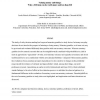Free Online Productivity Tools
i2Speak
i2Symbol
i2OCR
iTex2Img
iWeb2Print
iWeb2Shot
i2Type
iPdf2Split
iPdf2Merge
i2Bopomofo
i2Arabic
i2Style
i2Image
i2PDF
iLatex2Rtf
Sci2ools
MANSCI
2010
2010
Valuing Money and Things: Why a $20 Item Can Be Worth More and Less Than $20
The study of risky decision-making has long used monetary gambles to study choice, but many everyday decisions do not involve the prospect of winning or losing money. Monetary gambles, as it turns out, may be processed and evaluated differently than gambles with non-monetary outcomes. Whereas monetary gambles involve numeric amounts that can be straightforwardly combined with probabilities to yield at least an approximate “expectation” of value, non-monetary outcomes are typically not numeric and do not lend themselves to easy combination with the associated probabilities. Compared with monetary gambles, the evaluation of non-monetary prospects typically proves less sensitive to changes in the probability range (inside the extremes of certainty and impossibility), which, among other things, can yield preference reversals. Generalizing on earlier work by Rottenstreich and Hsee (2001), which attributed similar findings to the role of affect in the evaluation process, we attribute th...
| Added | 29 Jan 2011 |
| Updated | 29 Jan 2011 |
| Type | Journal |
| Year | 2010 |
| Where | MANSCI |
| Authors | A. Peter McGraw, Eldar Shafir, Alexander Todorov |
Comments (0)

